The Iliad (Penguin Classics) Read online
Page 27
Menelaus’ anxiety
Sleep did not come easily to Menelaus either. He too was obsessed by anxiety for the Greeks, who for his sake had come to Troy across a great expanse of water to start this audacious campaign. He threw a spotted (30) leopard’s skin round his broad shoulders, took up his bronze helmet and put it on, picked up his spear in his great hand and set out to rouse his brother, lord of all the Greeks and honoured like a god by his people. He found him by the stern of his ship, slinging his fine armour on his shoulders. Agamemnon was delighted to see him; but Menelaus, master of the battle-cry, was the first to speak:
‘My dear brother, why are you arming like this? Are you sending a man out to spy on the Trojans? I am much afraid you won’t find anyone willing to accept that duty. It would take a (40) brave heart indeed to venture out alone through the immortal night and spy on the enemy camp.’
Lord Agamemnon replied and said:
‘Olympian-bred Menelaus, you and I need a plan, and a clever one, to protect and secure the Greeks and our ships, now that Zeus has turned against us. It’s clear that Hector’s offerings (50) mean more to him than ours. That a single man – and no son of the gods either – should do the damage in the course of a day that Hector has done to our army is something quite outside my experience. But the fact remains that he has struck us blows which we will feel to our cost for many a long day to come.
‘But set off now past the ships and fetch Ajax and Idomeneus, while I go to godlike Nestor and tell him to get up. I want him to visit the guard-posts, which are so important, and keep the sentries on their toes. They will pay more attention to him than to anyone, since his own son and Idomeneus’ attendant Meriones are in command. We put them in special charge.’
(60) Menelaus, master of the battle-cry, replied:
‘Very well, but what instructions do you have for me? Am I to stay with Ajax and Idomeneus and wait for you to join us? Or run back to you when I’ve given them their orders?’
Agamemnon lord of men replied:
‘Stay with them, or you and I may miss each other among all the paths that cross the camp. And speak up to the men wherever you go. Tell them to remain on the alert, and mention their lineage and father’s name. Compliment them all (70) and don’t stand on ceremony. We too must do our part: Zeus seems to have decreed serious hardship for us at the moment of our birth.’
Nestor awakened
With these careful words of instruction Agamemnon dismissed his brother, and himself went in search of Nestor shepherd of the people. He found him lying on a soft bed beside his hut and black ship. At his side lay his ornate arms, a shield, two spears, and a shining helmet; also the glittering belt the old man put on when he armed himself to lead his men into the killing fields: for whatever the danger, he made (80) no concessions to wretched old age. Nestor, raising himself on his elbow and lifting his head, called out and challenged Agamemnon:
‘Who goes there, wandering about the camp alone, close to the ships, at dead of night, when everyone else is asleep? Are you looking for a stray mule or one of your friends? Speak up, but stay where you are till you answer. What’s your business here?’
Agamemnon lord of men replied:
‘Nestor son of Neleus, great glory of the Greeks, you will recognize Agamemnon son of Atreus, the man Zeus has singled (90) out for unending trouble as long as breath remains in my body and strength in my limbs. I’m wandering about because I am much too worried about the war and our plight to enjoy a moment’s sleep. I am so afraid for my people that my self-control has deserted me. I’m beside myself. My heart is leaping out of my chest, and my knees trembling.
‘But you aren’t sleeping any better than I am. If you want something to do, come with me and visit the sentries, to make sure they haven’t fallen asleep from exhaustion and lack of rest,
(100) forgetting all about their duties. The enemy are camped very close, and we know nothing of their plans. They might even be up for a night attack.’
Nestor the Gerenian charioteer replied:
‘Most glorious Agamemnon lord of men, Zeus wise in counsel is not going to let Hector realize all the high hopes he is presently entertaining. On the contrary, I reckon Hector will have even more to worry about than ever, if Achilles has a change of heart and abandons his present unrelenting rage. Of course I will go with you.
‘But let us wake some of the others in their turn – Diomedes (110) the great spearman, Odysseus, swift-footed Ajax son of Oi’leus and strong Meges. Someone should also go and call up the other two, godlike Ajax son of Telamon and lord Idomeneus, whose ships are at the end of the line and some way off.
‘But what’s up with Menelaus? I like and respect him, but I do feel critical of him, and won’t hide my feelings, even if it makes you angry. He should not be asleep at a time like this, leaving all the work to you. He ought to have been up and doing among all our leading men, entreating them to lend a hand. The situation is desperate.’
Agamemnon lord of men said:
(120) ’Venerable sir, there are times when I would indeed be glad to see you taking him to task. He is often inclined to do nothing and let things slide, not through laziness or stupidity, but because he looks to me to take the lead. Tonight, however, he got up well before me and came to see me. I have already sent him out to call up the two men you mentioned. So let’s be going. We shall find them with the sentries outside the gates, where I told them to meet.’
Nestor the Gerenian charioteer replied:
‘In that case, no one will have a word to say against him or (130) fail to pay attention when he takes command and urges them on.’
With these words he got into his tunic and bound a pair of fine sandals on his gleaming feet. Next he put on a purple cloak and fastened it with a brooch – it was a long double-folding cloak with a thick nap on the wool. Finally he picked up a strong spear with a sharp point of bronze, and set out on his way past the ships of the bronze-armoured Greeks.
The first man that Nestor the Gerenian charioteer woke up was Odysseus, equal in invention to Zeus. He gave him a call (140) and, as soon as he heard it, Odysseus came out of his hut and questioned his visitors:
Other Greeks roused
‘Why are you wandering about on your own through the men’s huts and the ships at this time of night? What brings you here? It must be something serious.’
Nestor the Gerenian charioteer replied:
‘Olympian-born son of Laertes, resourceful Odysseus, don’t be annoyed with us. The Greeks are indeed in serious trouble. But come along with us, and let’s wake up some of the others we ought to consult before deciding whether to leave or fight on.’
So he spoke, and quick-thinking Odysseus went into his hut, slung his ornate shield on his back and followed them. They (150) went next to Diomedes son of Tydeus and found him lying there, some way outside his hut, with his armour. His men were sleeping round him with their shields for pillows. The spiked butt-ends of their spears were stuck in the ground, and the bronze points flashed in the distance like lightning from Father Zeus. The warrior was asleep, with the hide of a farmyard ox underneath him and a glossy rug drawn under his head. Nestor the Gerenian charioteer went up to him, gave him a kick, woke him up and said jokingly:
‘Wake up, son of Tydeus! Why are you sleeping in luxury all (160) night long? Has it escaped your notice that the Trojans are camped out near our ships on the high ground just above us, and virtually nothing separates us?’
So he spoke, and Diomedes, who had woken and leapt up at great speed, spoke winged words:
‘You’re a tough one, my old fellow. Always on the go. Haven’t we got any younger men to do the rounds and wake up all the leaders? You’re quite impossible, old man.’
Nestor the Gerenian charioteer said:
(170) ’My friend, all that is very true. I have my handsome sons and plenty of troops to do the rounds and call people up. But we are in a critical position, on a razor’s edge – an unpleasant death for every Greek,
or else deliverance. However, if you are feeling sorry for me – and you are the younger man – go yourself and wake up Meges and swift-footed Ajax son of Oïleus.’
So he spoke, and Diomedes threw round his shoulders the glossy skin of a great lion, which reached to his feet, picked up his spear and went on his way. When he roused the two men from their huts, he brought them along with him.
(180) The party then visited the guards at their posts, but failed to catch any of their leaders asleep. They were all sitting there with their weapons, on the alert. As dogs keep uneasy watch over their flocks in a farmyard, having heard some savage animal coming down from the mountains into a wood and the hue and cry of men and hounds behind it, and all thoughts of sleep are banished, so sweet sleep was banished from the eyes of the sentries as they kept watch throughout that unfriendly night. All their attention was turned towards the plain to catch the first sign of any Trojan movement.
(190) Old Nestor was delighted to see them like this, encouraged them and spoke winged words:
‘That’s the way, lads. Carry on. Let no one take a nap, or we’ll give the enemy something to cheer about.’
With these words he crossed the ditch, followed by the Greek leaders who had been summoned to the council. Meriones and Nestor’s noble son Thrasymedes came with them too, having been invited to assist at the conference. Leaving the ditch behind them, they sat down in an open place where the ground was (200) clear of bodies. It was the very spot where imperious Hector had turned back from slaughtering the Greeks when night descended on the battlefield. Seated there, they started to exchange ideas. Nestor the Gerenian charioteer began and spoke his mind:
Nestor proposes a night sortie (8.491)
’My friends, couldn’t someone with enough daring and confidence pay these arrogant Trojans a visit, on the chance of cutting off a straggler from the enemy? He might even overhear some talk about their intentions, and so find out whether they mean to stay in their (210) advanced position by our ships or retreat back into town, after inflicting this defeat on the Greeks. If he discovered that and returned in one piece, his fame would spread world-wide. He’ll be splendidly rewarded too. Every ship’s commander will give him a black ewe with its suckling lamb, a reward second to none, and he will be invited to all their dinners and ceremonial feasts.’
So he spoke and was received in complete silence by them all. Then Diomedes, master of the battle-cry, addressed them:
(220) ’Nestor, this adventure appeals to me. The Trojan camp isn’t far off either. I’ll visit it. But if someone else came with me, I’d feel more comfortable and also more inclined to take a risk. When men work in pairs, one sees advantages the other would miss, while a man on his own may see the possibilities, but lack the necessary imagination and intelligence.’
So Diomedes spoke, and many volunteered to go with him. Both the Ajaxes, attendants of Ares, wished to go. So did Mer-iones; and Nestor’s son Thrasymedes was eager. The famous (230) spearman Menelaus also volunteered; and daring Odysseus also wanted to steal in among the Trojan troops – adventure was always dear to him. Agamemnon lord of men now addressed them:
‘Diomedes son of Tydeus, my pride and joy, pick the companion you want, the very best of the volunteers. There are plenty of them. Don’t let undue deference make you leave the better man and take the worse out of respect for his birth, not even if he is of higher rank.’
(240) So he spoke, in terror for his brother auburn-haired Menelaus. Diomedes, master of the battle-cry, then addressed them:
Diomedes and Odysseus volunteer
’If you really are instructing me to choose my companion myself, how could I overlook godlike Odysseus, who puts a willing heart and soul into everything he does, and Pallas Athene loves him too? With this man beside me, we could go through blazing fire and still get back. His intelligence is without equal.’ All-daring godlike Odysseus said:
‘Diomedes, don’t sing my praises – or faults. You are talking (250) o men who know all this already. Let’s be off. The night is well advanced – it’s nearly dawn. The stars are past their zenith, and a good two-thirds of the night is gone, leaving us the third watch only.’
With these words they slung on their formidable gear. The Resolute Thrasymedes gave Diomedes a two-edged sword, as he had left his own behind beside his ship, together with a shield. On his head he put an oxhide helmet without cheek-plates or crest, of the sort called ‘skull-cap’, which young men wear to protect their heads.
(260) Meriones gave Odysseus a bow, a quiver and a sword, and put a cleverly made leather helmet on his head. On the inside there was a strong lining of interwoven straps, onto which a felt cap had been sewn in. The outside was cleverly adorned all round with rows of white tusks from a shiny-toothed boar, the tusks running in alternate directions in each row. This helmet originally came from Eleon where Autolycus stole it from Amyn-tor by breaking into his well-protected house. Autolycus gave it to Amphidamas of Cythera to take to Scandaea; and Amphid-amas gave it to Molus in return for hospitality. Molus, in his (270) turn, gave it to his son Meriones to wear, and now it was Odysseus’ head that it served to protect.
They arm and pray to ATHENE
Armed in this formidable manner the pair set out, leaving all the chieftains there. Pallas Athene sent them a lucky omen, a heron close to their path on the right. The night was too dark for them to see the bird, but they heard it squawk and Odysseus, pleased by the omen, offered a prayer to Athene:
‘Hear me, daughter of Zeus who drives the storm-cloud, you that stand by me in all my adventures and never forget me when (280) I go into action. Tonight, Athene, show me your special favour, and grant that we come back to the ships with some great deed to our credit, which will give the Trojans something to think about.’
Diomedes, master of the battle-cry, followed him with a prayer of his own:
‘Daughter of Zeus, Atrytone, hear me also. Be with me as you were with my godlike father, Tydeus, when he went into Thebes as ambassador for the Greeks, leaving their army on the banks of the Asopus. He went there with an offer of peace for the Thebans; but on his way back he performed heroics, seeing off (290) their ambush in which you helped him, celestial goddess, with your keen support. Stand willingly by me now and watch over me, and in return you shall have from me a year-old heifer, broad in the brow, which has never worked or been led under the yoke. She will be sacrificed to you with gold leaf round her horns.’
So they prayed; and Pallas Athene heard them. When their prayers to the daughter of great Zeus were finished, they set out through the black night like a pair of lions, picking their way through the slaughter, the bodies, the armour and the black blood.
(300) (Dolon volunteers for Hector’s night raid) Hector did not allow the proud Trojans much time to sleep either. He called together all the leading men, their rulers and leaders and, when he had gathered them round him, put a carefully considered plan to them: ‘Will anyone take on and see through this job I have in mind? There will be a rich reward, which I can guarantee. I will give the best chariot and pair of thoroughbreds in the Greek camp to the man who dares – it will mean glory for him – to approach their ships and find out whether (310) they are guarded as usual or whether, as a result of their defeat at our hands, they are already discussing the possibility of flight, and are so utterly exhausted that they are not troubling to keep watch during the night.’
So he spoke and was received in complete silence by them all. But among the Trojans present was the son of the sacred herald Eumedes, Dolon, a rich man with plenty of gold and bronze. His appearance was certainly unattractive, but he was fast on his feet; and in a family of six he was the only son. This man then spoke his mind to Hector and the Trojans:
‘Hector, the adventure appeals to me. I volunteer to ap- (320) proach the Greek ships and find out the situation. But first, will you hold up this staff and swear to give me the horses and bronze-inlaid chariot that matchless Achilles drives? I shan’t be useless as a spy, o
r fall below your expectations. I mean to go right through the camp till I come to Agamemnon’s ship, where I assume their leaders will be discussing whether to retreat or fight on.’
So he spoke, and Hector took the staff in his hands and gave Dolon his oath:
‘Let Zeus himself, loud-thundering husband of Hera, hear me (330) swear that no other Trojan shall ride behind those horses, and you will pride yourself on them for the rest of your days.’
So he spoke, swore an oath that was not to be fulfilled, and sent him on his way. Dolon at once slung his curved bow on his shoulders, threw the pelt of a grey wolf over it, put a weasel-skin cap on his head and, picking up a sharp spear, set out from the camp in the direction of the ships. Not that he was destined to come back from them with news for Hector. However, once he had put behind him the crowds of horses and men in the camp, he sped keenly on his way.
(340) Olympian-born Odysseus saw him coming towards them and said to Diomedes:
Dolon caught and questioned
‘Here comes a man from the enemy camp, Diomedes, maybe to spy on our ships, or strip some of the bodies – I can’t say which. Let’s wait for him to get past us a little. Then we leap out and grab him. If he’s too fast for us, menace him with your spear and force him all the time towards our ships and away from his camp, so that he can’t slip back into Ilium.’
With these words they turned off and lay down among the (350) dead beside the path. Dolon in complete ignorance passed by them at a run. When he was as far ahead as the width of a day’s ploughing by mules (and they are better than oxen at dragging a jointed plough through the deep soil) , the two men gave chase. Dolon stopped when he heard the footsteps behind him, imagining they were friends coming from the Trojans to turn him back because Hector had changed his orders. But when they were less than a spear’s throw away, he saw they were the enemy and sprinted off in flight.

 The Odyssey
The Odyssey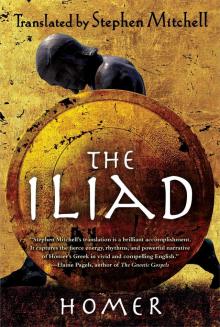 The Iliad
The Iliad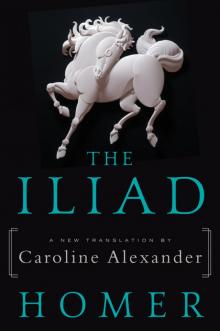 The Iliad (Trans. Caroline Alexander)
The Iliad (Trans. Caroline Alexander)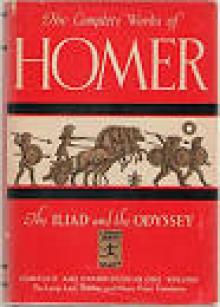 Complete Works of Homer
Complete Works of Homer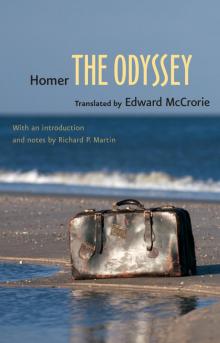 The <I>Odyssey</I>
The <I>Odyssey</I>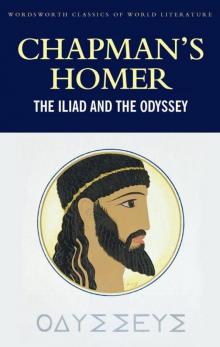 The Iliad and the Odyssey (Classics of World Literature)
The Iliad and the Odyssey (Classics of World Literature)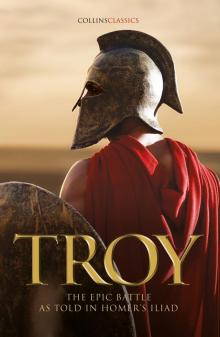 Troy
Troy The Iliad (Penguin Classics)
The Iliad (Penguin Classics)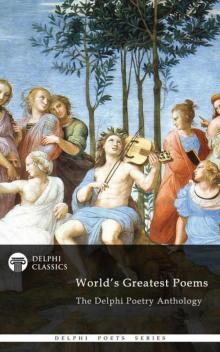 Delphi Poetry Anthology: The World's Greatest Poems (Delphi Poets Series Book 50)
Delphi Poetry Anthology: The World's Greatest Poems (Delphi Poets Series Book 50)